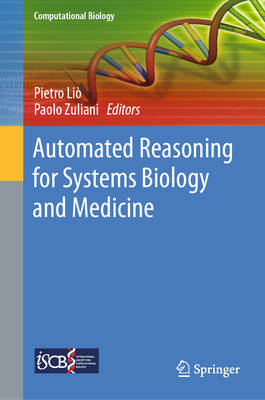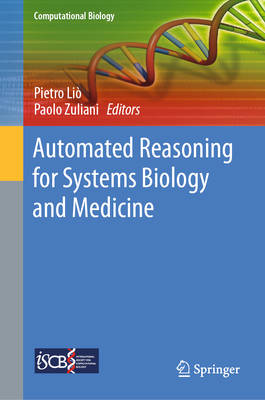
- Retrait gratuit dans votre magasin Club
- 7.000.000 titres dans notre catalogue
- Payer en toute sécurité
- Toujours un magasin près de chez vous
- Retrait gratuit dans votre magasin Club
- 7.000.0000 titres dans notre catalogue
- Payer en toute sécurité
- Toujours un magasin près de chez vous
Automated Reasoning for Systems Biology and Medicine
105,45 €
+ 210 points
Description
This book presents outstanding contributions in an exciting, new and multidisciplinary research area: the application of formal, automated reasoning techniques to analyse complex models in systems biology and systems medicine. Automated reasoning is a field of computer science devoted to the development of algorithms that yield trustworthy answers, providing a basis of sound logical reasoning. For example, in the semiconductor industry formal verification is instrumental to ensuring that chip designs are free of defects (or "bugs"). Over the past 15 years, systems biology and systems medicine have been introduced in an attempt to understand the enormous complexity of life from a computational point of view. This has generated a wealth of new knowledge in the form of computational models, whose staggering complexity makes manual analysis methods infeasible. Sound, trusted, and automated means of analysing the models are thus required in order to be able to trust their conclusions. Above all, this is crucial to engineering safe biomedical devices and to reducing our reliance on wet-lab experiments and clinical trials, which will in turn produce lower economic and societal costs. Some examples of the questions addressed here include: Can we automatically adjust medications for patients with multiple chronic conditions? Can we verify that an artificial pancreas system delivers insulin in a way that ensures Type 1 diabetic patients never suffer from hyperglycaemia or hypoglycaemia? And lastly, can we predict what kind of mutations a cancer cell is likely to undergo? This book brings together leading researchers from a number of highly interdisciplinary areas, including: · Parameter inference from time series · Model selection · Network structure identification · Machine learning · Systems medicine · Hypothesis generation from experimental data · Systems biology, systems medicine, and digital pathology · Verification of biomedical devices
"This book presents a comprehensive spectrum of model-focused analysis techniques for biological systems ...an essential resource for tracking the developments of a fast moving field that promises to revolutionize biology and medicine by the automated analysis of models and data."Prof Luca Cardelli FRS, University of Oxford
"This book presents a comprehensive spectrum of model-focused analysis techniques for biological systems ...an essential resource for tracking the developments of a fast moving field that promises to revolutionize biology and medicine by the automated analysis of models and data."Prof Luca Cardelli FRS, University of Oxford
Spécifications
Parties prenantes
- Editeur:
Contenu
- Nombre de pages :
- 474
- Langue:
- Anglais
- Collection :
- Tome:
- n° 30
Caractéristiques
- EAN:
- 9783030172961
- Date de parution :
- 24-06-19
- Format:
- Livre relié
- Format numérique:
- Genaaid
- Dimensions :
- 159 mm x 254 mm
- Poids :
- 952 g

Les avis
Nous publions uniquement les avis qui respectent les conditions requises. Consultez nos conditions pour les avis.





